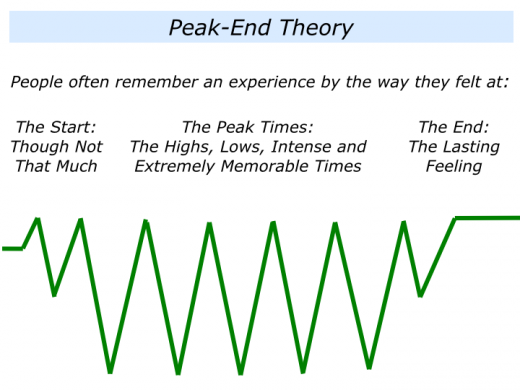Why do people react differently to what appear to be similar experiences?
Certainly it has a lot to do with their attitude. But it also has much to do with how they interpret and remember experiences.
In this TED talk Daniel describes the difference between the experience we have and the memory of that experience. He has said on several occasions that:
There always is a difference between the experiencing self and the remembering self and how we weigh episodes in our lives.
We don’t choose between experiences, we choose between memories of experiences.
Even when we think about the future, we don’t think of our future normally as experiences. We think of our future as anticipated memories.
Daniel reiterates this view in an interview with Der Spiegel. He says:
Every experience is given a score in your memory: good, bad, worse. And that’s completely independent of its duration.
Only two things matter here: the peaks – that is, the worst or best moments – and the outcome. How did it end up?
You can find the whole interview here:
Daniel explains what became known as Peak-End Theory.
This says that, when looking back, people do not necessarily recall their feelings throughout an experience. Instead, they remember the way they felt at:
The peak times – the intense times – in the experience.
The end of the experience.
The peak times may be pleasant or unpleasant. These are the memories that stay with us; as does the way we felt at the end of the experience.
Daniel tested the Peak-End theory in a variety of situations. But it can also be applied to how we remember, for example:
A relationship.
A job we performed at some point in our career.
A sporting event, musical performance or other experience.
Daniel explains that this approach has implications for the way we make decisions. The memories we associate with past experiences play a strong part in determining the routes we choose to pursue in the future.







Leave a Reply